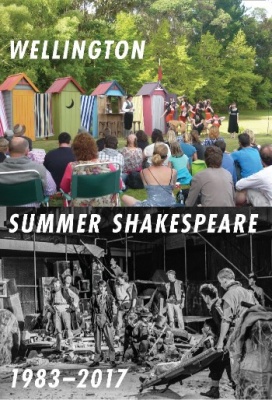WELLINGTON SUMMER SHAKESPEARE 1983–2017
VICTORIA UNIVERSITY PRESS (VUP), Global
01/03/2017 - 15/12/2017
Production Details
Written by David Lawrence
Published by the Victoria University Press and the Summer Shakespeare Trust
Since its first production of A Midsummer Night’s Dreamin 1983, the Wellington Summer Shakespeare has become an unmissable annual event, staging some of the liveliest Shakespeare productions performed in New Zealand. Over 33 years, the Summer Shakespeare has enthralled audiences, introduced new generations of theatregoers to Shakespeare in performance, and played a formative role in the early careers of many of New Zealand’s leading creatives. Wellington Summer Shakespeare 1983–2017 collects photos, ephemera and memories from some of the plays’ directors to document the evolution of Wellington’s only large-scale, large-cast, outdoor theatre event.
David Lawrence is a director, musician and actor, best known for his work with The Bacchanals, the theatre company he founded in 2000. His association with the Summer Shakespeare began in 1993, and he was co-chair of the Summer Shakespeare Trust from 2012–2016. David is a Hunter Fellow of Victoria University, and in 2013 he was a member of the International Actors’ Fellowship at Shakespeare’s Globe. He is currently head of production for Pop-up Globe Auckland.
To buy go to: http://vup.victoria.ac.nz/wellington-summer-shakespeare-1983-2017/
Theatre , Book ,
128 pages
The making of an institution
Review by Tim Stevenson 27th Mar 2017
It all started back in 1983, with a coruscating production of A Midsummer Night’s Dream in the Victoria University quadrangle. A recent DomPost article emphasised director Adrian Kiernander’s shock/modern concept of the play and the performance of Lester McGrath [now Chief Executive of the Auckland Theatre Company] as a six-foot four punk Puck. Quite right, too; McGrath’s Puck was a piece of acting genius: athletic, feline, insinuating, complex.
But the show had plenty of other gems as well. This writer remembers Oberon (Graeme William Austin), dressed as rockstar royalty, greeting his hip/glamorous Queen (Lynette Thorstensen): “Ill met by moonlight, proud Titania.” The spectacle and delivery made the message to the audience clear. Stop worrying about early on-set hypothermia; here is Shakespeare with a difference, bold, sexy, facing down the conventions with a punk sneer.
A Midsummer Night’s Dream set the pattern for shows to follow. Big casts of enthusiastic young actors. Wild new readings of old classics; obscure plays dragged back into the light. Passages of brilliance; passages that did their gallant best. Outdoor settings, anywhere between magic in the night and cruel arctic discomfort.
An institution was in the making. Over 35 years the capital has seen 34 Summer Shakespeare productions [2008 missed out]. This achievement has now been celebrated in a book, Wellington Summer Shakespeare 1983-2017, written by actor / director / musician David Lawrence, published by the Victoria University Press and the Summer Shakespeare Trust (of which Lawrence was co-chair, 2012-16).
Wellington Summer Shakespeare 1983-2017 looks back over all 34 productions, one by one. For each play put on, the book tells us something of the director’s concept, preparations and rehearsals, and the performance; all this in varying levels of detail. Cast and crew are listed. There’s a linking narrative about the decisions and challenges that had to be tackled to make the productions happen. The leading character here is undoubtedly the choice of venue, with factors like availability, audibility, cost and neighbour-friendliness jostling each other.
Summer Shakespeare directors have contributed accounts of their experiences. The picture is filled out with quotes from theatre reviews, some actor’s tales, lots of photos, and what seems to be Lawrence’s own research.
Wellington Summer Shakespeare 1983-2017 was originally commissioned to complement a 30th anniversary Summer Shakespeare exhibition in 2013. Something of the book’s origins still shows. The style is informal, anecdotal, upbeat. The emphasis is on celebrating success, or at least, putting a brave face on the darker moments, or years.
There’s plenty of success to celebrate. Wellington audiences get a steady supply of Shakespeare productions; directors, actors and crew members get the chance to express themselves creatively, plus something for their CV; the cast/crew parties are legendary.
There is no shortage of dark moments as well. Thieves steal the gear. The acoustics are no good, or the neighbours complain about the noise. Seating collapses. Critics fail to grasp the subtlety of the director’s concept; audiences stay at home … And always, lurking behind the circling hills, ready to pounce like a savage beast when least expected, Wellington’s weather …
With 34 productions to cover, Lawrence has had to pick and choose his material. Readers who like to look behind the facade and see the machinery at work won’t find much about costs and funding, box office receipts, remuneration, governance, debates about strategy and purpose. The directors’ accounts provide revealing detail, but are directors best placed to give a rounded view of their own productions? We hear little from the Victoria University Drama Club management or from other Summer Shakespeare Trust members, and not much more from actors or crew.
None of this detracts from the author’s achievement. He has produced a valuable record of a significant Wellington cultural institution. It’s a must-buy for followers of New Zealand theatre, national or local, and a perfect present / memento for members of former casts and crew. Those more inclined to ask, “Why does the show have to go on – exactly?” may well find an answer here. Because generations of Summer Shakespeare folk plainly love their theatre so much that they persist, year in year out, in defying the elements, like Lear:
Blow, winds, and crack your cheeks! rage! blow!
You cataracts and hurricanoes, spout
Till you have drench’d our steeples, drown’d the cocks!
Copyright © in the review belongs to the reviewer







Comments